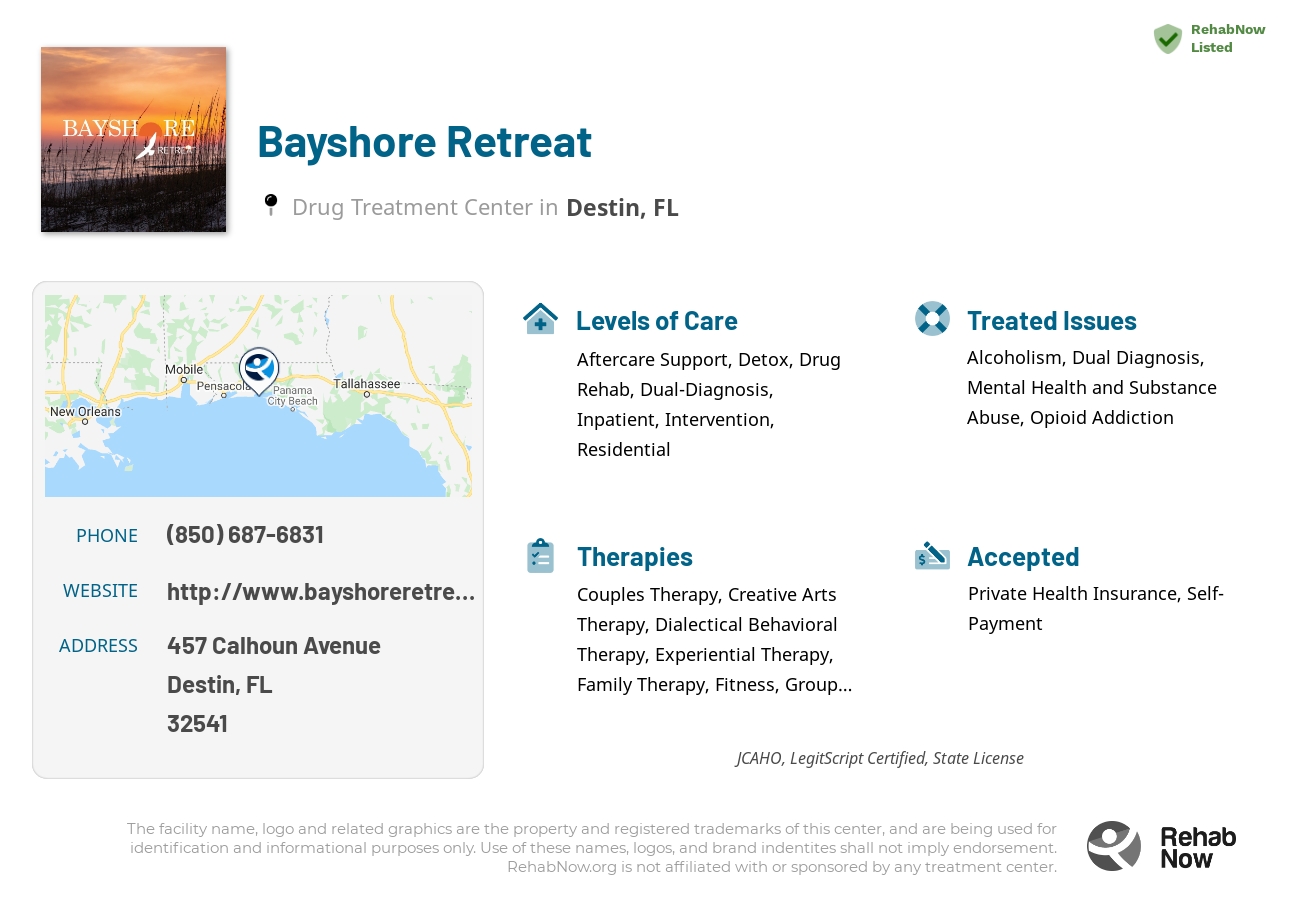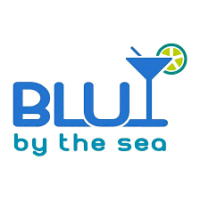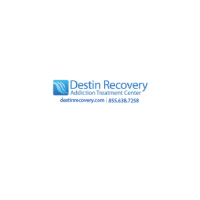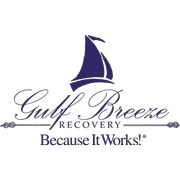Bayshore Retreat
Drug Rehab Center in Destin, Florida
Bayshore Retreat in Destin, Florida is a reputable and accredited treatment center offering personalized and comprehensive care for alcoholism, addiction, substance abuse, and mental health issues through various levels of treatment, acceptance of private health insurance, and a continuum of care approach.
About Bayshore Retreat in Florida
Bayshore Retreat is a residential drug and alcohol rehab facility located in Destin, Florida, set in a beautiful house on the bay. With a focus on holistic and personalized treatment, their caring clinicians have extensive experience in addressing substance abuse and co-occurring mental health issues. The facility offers a luxurious and peaceful environment, accommodating up to 6 clients at a time.
During their stay, clients can continue working if desired, enjoying private rooms, an onsite gym, pool, sauna, yoga, and meals prepared by an in-house executive chef. The holistic approach emphasizes physical, mental, and spiritual health through counseling sessions, including individual, group, and family therapy.
Bayshore Retreat is accredited by JCAHO, LegitScript, and holds a State License, ensuring high-quality and accredited treatment services. They offer various levels of care, including detox, inpatient rehabilitation, dual-diagnosis treatment, and residential programs. Their comprehensive approach includes aftercare support, detoxification services, drug rehabilitation programs, and intervention services.
- Personalized treatment with a 3:1 staff-to-client ratio
- Holistic approach with sauna, exercise, vitamins, and chef-prepared meals
- Weekly deep tissue massage and yoga classes
Bayshore Retreat specializes in treating alcoholism, dual diagnosis, opioid addiction, drug addiction, substance abuse, and mental health issues. Their goal is to help clients achieve optimal health and overcome addiction through a tailored and comprehensive treatment plan.
Genders
Ages
Modality
Additional
Accreditations
State License

LegitScript

JCAHO
Conditions and Issues Treated
Substance abuse creates problems that affect people in Destin, FL on many levels. First, substance abuse affects the individual who is abusing drugs or alcohol. This can result in health problems, including heart damage and overdose. Substance abuse also affects the user’s family, friends, co-workers, classmates, or peers. These people feel frustrated because they do not know how to help their loved ones struggling with addiction. At the same time, the addict cannot control his behavior. Lastly, friends and family members of addicts are affected financially by substance abuse.
The good news is that effective treatments can help prevent substance abuse or treat its effects on the user. These treatments, which include behavioral therapy and counseling sessions, target the underlying causes of substance abuse, helping users achieve sobriety so they can regain control over their lives. They also teach users to cope with stress in ways other than using drugs or alcohol.
Opioid addiction has become a significant health problem in the United States. When a person’s life becomes unmanageable because of an opioid addiction, treatment can help them get sober. Treatment includes medical care and counseling.
“With so many people struggling with opioid addiction, we need more care and attention for those who want to quit. Opioid addicts often take opioids when they experience a painful injury – that’s how the cycle starts! When someone begins taking their medication differently than prescribed or takes an excessive amount of drugs, it means they’re hooked on drugs and in danger of overdosing.
The most successful way to beat this is through detoxing from these types treatments at Bayshore Retreat in . Most facilities start by using medical support during the process while providing counseling services; rehabilitation comes later on after treatment has been completed successfully.
A “dual diagnosis” is when the individual has two medical issues at the same time. The top co-occurring mental disorders with addiction are depression, anxiety, ADHD, bi-polar disorder. Addiction is also considered a mental illness that is not a choice but rather a medical condition. Addiction can be caused by any number of underlying issues.
Dual diagnosis is provided by Bayshore Retreat to treat addictive tendencies as well as any untreated mental illnesses. This ensures successful long term health and recovery for patients after treatment has been completed.
Dual diagnosis is provided by Bayshore Retreat to treat addictive tendencies as well as any untreated mental illnesses for people in Florida. This ensures successful long term health and recovery for patients after treatment has been completed.Levels of Care Offered
This center offers a variety of custom treatment tailored to individual recovery. Currently available are Aftercare Support, Detox, Drug Rehab, Dual-Diagnosis, Inpatient, Intervention, Residential, with additional therapies available as listed below.
The first level of recovery is detox. It involves giving a person the opportunity to get the toxins out of their body safely. The individual receiving treatment at Bayshore Retreat typically will get ill during detox, and they will often start using again to get rid of unpleasant emotions and complicated physical responses. It is why having a Florida medical professional present is so critical. A medical professional can make sure that patients do not start using again during detox and stay physically healthy during the process. They will also have treatment on a mental level to relieve their symptoms and guide them through the process.
Going to an inpatient rehab facility means living there while all aspects of addiction or co-occurring disorder get addressed. The treatment involves medical supervision, therapy, and future planning.
This type of rehabilitation provides a drug-free environment for people who struggle with chronic/long-term addiction without having access to drugs outside the center (or their own home). It takes away any distractions because they live there 24 hours per day. If someone is trying to break out old habits, which could lead them back into substance abuse, things like jobs or school can be put on hold until after they complete their stay to focus solely on recovery.
Residential treatment programs are those that offer housing and meals in addition to substance abuse treatment. Rehab facilities that offer residential treatment allow patients to focus solely on recovery, in an environment totally separate from their lives. Some rehab centers specialize in short-term residential treatment (a few days to a week or two), while others solely provide treatment on a long-term basis (several weeks to months). Some offer both, and tailor treatment to the patient’s individual requirements.
Interventionism is a technique used to help an addict get clean and sober. The process begins with the addict’s family, friends, and co-workers gathering together to confront the addict about their addiction. This often happens when the addict is in the middle of a particularly bad bout of drug abuse.
The addict’s friends and family members are encouraged to share their feelings about the addict’s behavior with them, as well as what it’s doing to the addict and their loved ones. At first, the addict is typically resistant to this form of treatment because they feel it’s an intrusion on their private life. They may be upset or even angry at the interventionist for orchestrating this meeting. Over time, though, most addicts come to understand that their loved ones are only trying to help them.
During the intervention, the addict’s family and friends are encouraged to tell the addict how their drug use has affected their lives. The interventionist is there to help everyone organize their thoughts and communicate their message. They also help to ensure that the conversation doesn’t become aggressive or combative, which could put the addict on the defensive and make them reject the intervention.
This kind of treatment aims to get the addict in touch with their feelings about their addiction. They are encouraged to speak honestly about their drug use, as well as how it’s making them feel. They’re also asked to consider the consequences of their drug use and how it’s hurting their loved ones. The addict is allowed to see how their addiction has become a problem for everyone around them.
Without aftercare support, addicts can easily relapse back into addiction. It is crucial to integrate the addict back into society. Aftercare support should take place after outpatient treatment has ended.
There are a few different types of aftercare support that patients can seek after completing an inpatient treatment program:
- 12 Step Self-help groups (AA, NA)
- Therapeutic communities,
- Long-term, structured sober living arrangements
- Halfway houses (residential treatment centers)
Many different support groups exist for addicts to seek help after treatment. Some are more effective than others, depending on the person’s addiction, background, and other factors.
Therapies & Programs
Individual therapy is a form of counseling where you meet with a trained professional one-on-one. Meeting with a therapist in this setting allows for a personal and trusting relationship to be built. This allows the patient to open up about sensitive or private issues they may not feel comfortable discussing in a group. Individual therapy helps identify the root causes of your addiction, which can help prevent relapse.
Couples therapy for drug addiction is a unique form of therapy that allows family members to work through the emotional issues of their loved one’s addiction together. Family members can support each other while learning how to cope with the addiction and encourage healthy changes. The two will work with a therapist to learn how the addiction affects themselves and the relationship.
Family therapy is often done alongside drug treatment to help addicts stay sober. The goal of family therapy for drug addiction is to create an environment where communication can happen without judgment, hostility, or blame. The therapist will sit with the family so they can learn how to communicate differently and provide new tools for dealing with emotions so that people don’t want to drink or do drugs. It’s important for families to focus on relapse prevention plans during treatment so that if the addict feels like they want to use again, they’ll know what steps they need to take together to prevent it from happening again in the future.
Group therapy sessions are another common addiction recovery service. These group sessions typically involve six to 12 addicts who meet regularly with a trained professional for support and guidance.
During these sessions, the group shares their experiences with one another and provides feedback that can help each member avoid relapse or overcome specific obstacles they are facing in their recovery process. With this type of support and guidance, addicts can feel like they are part of a community that understands their struggles and will help them get through the hard times.
Many people struggling with drug addiction have experienced some form of trauma in their lives. It is crucial that these individuals seek out professional help; otherwise, their drug abuse and addiction will likely continue.
Therapists and counselors at drug treatment centers employ several treatment programs to help people struggling with drug addiction, including trauma therapy. Trauma therapy helps people dealing with addiction by allowing them to confront the traumas of their past and move past them.
It is important to note that trauma therapy should not be confused with PTSD (post-traumatic stress disorder). Rather, it is used to treat the effects of trauma, which are often at the root of addiction.
Dialectical Behavior Therapy was developed in the 1980s to treat chronically suicidal individuals. It is a cognitive-behavioral therapy that combines standard DBT with strategies derived from Zen Buddhism, such as mindfulness training.
DBT has been adapted for use with other types of psychiatric problems, including eating disorders, substance abuse disorders, borderline personality disorder, posttraumatic stress disorder (PTSD), and other personality disorders. Dialectical Behavior Therapy is considered a psychosocial treatment of BPD. This means that while it can be used alone or in conjunction with drug treatments, DBT does not rely on medications to treat the disorder. Instead, DBT aims to help patients change their thinking and behavior.
Cognitive Behavioral Therapy (CBT) focuses on the underlying thoughts and behaviors that caused the problem of addiction in the first place and may cause a relapse. Negative feelings are common in drug abuse disorders, but they can lead to co-occurring disorders if not recognized. CBT involves strategies that help to change the behavior pattern by restructuring negative thoughts into positive ones. It helps to remove these feelings, and it provides long-term benefits. Also, CBT promotes self-awareness and self-control. It can be administered as a monotherapy or as part of combination therapy.
CBT can improve the patient’s mood, reduce drug cravings and boost success rates on treatment plans. Regular practice can help individuals handle negative attitudes, thoughts, and feelings without turning to drugs or alcohol. The core belief of Cognitive Behavioral Therapy (CBT) is that one’s moods, behaviors, and actions are all connected. Individuals can improve their quality of life using CBT. It helps addicts understand the patterns of thought and feelings that cause them to use drugs or alcohol and develop a healthy response.
It’s not as simple as quitting drinking or using drugs and expecting the hard part to be over. Many addicts in recovery have discovered that they need to improve skills such as time management, organization, communication, socialization, and self-esteem. Learning certain life skills can help those who are struggling with addiction.
The 12-step program is one of the most common forms of addiction treatment today. It consists of attending meetings and working with a sponsor to follow the 12 steps outlined by Alcoholics Anonymous (AA). The 12-step program was created to assist alcoholics in getting sober and staying clean. However, it is now used for a variety of addictive substances. The 12-step program encourages addicts to completely give up their former lifestyle, which is not always practical or possible for everyone.
It is essential to remember that abstinence from drugs and alcohol is the only way to ensure long-term sobriety.
12-Step programs can be beneficial for some people, but it all depends on the individual and whether or not they’re capable of completely giving up their addiction. This method is not for addicts who are unwilling to or have no desire to quit using and so is best utilized when paired with other treatment methods.
Medical nutrition therapy for addiction helps patients at Bayshore Retreat avoid “trigger” foods. Someone who craves alcohol may be sugar addicted. Eating a balanced diet with adequate protein, vegetables, and fruit can help reduce drinking urges.
MNT is a type of addiction treatment that teaches patients about healthy eating habits while counseling them. These sessions include meal planning, cooking demonstrations, shopping tips, grocery store tours, and food education.
Nicotine replacement therapy is a drug treatment that allows people to get the effects of nicotine without chewing or smoking. The therapy is often done with a patch, and doses of nicotine are reduced until nicotine is no longer needed. NRT helps smokers get nicotine into their system without resorting to smoking, and it has been shown to be an effective way to help people quit smoking. Coupling NRT with counseling and other means of support gives long-term smokers a better chance of removing their unhealthy habit.
Contingency Management (CM) is one of the most widely used behavioral approaches to improving drug addiction outcomes. CM aims to change behavior by linking desired behaviors (such as abstinence) with some reward. Incentive programs have been used successfully in various settings, and research has suggested they can increase engagement in health care. LPE is a treatment that engages clients by reinforcing points, tokens, or coupons that can be traded for items that are especially reinforcing.
Patient Experience
Creative Arts
Creative Arts Therapy is one of the most effective types of therapy used in addiction recovery. The use of art, music, dance and other creative pursuits stimulate neurogenesis (the growth of new brain cells) Many addicts have short attention spans and have difficulty focusing on tasks. Creative arts therapy promotes changes in brain function to increase memory and the ability to focus; it also helps raise awareness of feelings.
Experiential Therapy at Bayshore Retreat
Drug addiction causes the formation of abnormal connections between neurons in the brain to form due to repeated exposure to drugs. These connections are responsible for addictive behaviors to drugs. Experiential therapy is done with patients individually and is different from traditional talk therapy. This therapy can help people revisit past traumas, heal, and move on in life in a more authentic way.
Experiential therapy uses activities to recreate experiences that may have caused trauma or negative emotions. These activities include role-playing, arts and crafts, animal care, music, or rock climbing. The individual will gradually experience calmness and love and change their perception positively through this therapy. Other than drug addiction, experiential therapy can be helpful for behavioral or eating disorders.
Fitness Therapy
A fitness therapist may suggest a variety of workouts to help you improve your strength, endurance, speed, and agility. Whether recovering from an injury or illness, getting back into shape after a long layoff, or looking for ways to increase stamina, the plan is often tailored to a specific individual’s needs. Training can take place in a gym or at home.
- Encouraging healthy eating and exercise habits to really get the body back into good working order
- Providing a distraction from cravings and underlying psychological issues that could lead to relapse
- Gaining a sense of accomplishment from completing physical challenges that further personal development
- Improving cardiovascular health and circulatory system functioning and increased energy levels to help the body stay active and enhance mood
Payment Options Accepted
For specific insurance or payment methods please contact us.
Is your insurance accepted?
Ask an expert, call (888) 674-0062
Additional Details
Specifics, location, and helpful extra information.
Destin, Florida 32541 Phone Number(850) 687-6831 Meta DetailsUpdated April 15, 2024
Staff Verified
Is Bayshore Retreat a LegitScript Verified Treatment Facility?
According to our most recent records, we have found this center to be LegitScript verified.
Bayshore Retreat Patient Reviews
There are no reviews yet. Be the first one to write one.
Destin, Florida Addiction Information
Florida is one of the nation's epicenters for substance abuse and drug-related overdoses. In 2014, around 410,000 Florida residents were addicted to drugs and alcohol. Over the last 10 years, 12% of all deaths in the state were attributed to substance abuse. Treatment admissions for alcohol reached 24,329 patients in 2016, and 2.5% of Florida high school students admitted to using crack cocaine.
Unfortunately, drug addiction in Destin, Florida, is quite widespread. According to recent statistics, over 1,000 hospitalizations related to drug abuse in Destin in 2016 alone. This number is only increasing as time goes on. There are many options for rehabilitation and support in the area, and those who seek help will be able to find the resources they need for their treatment.
Treatment in Nearby Cities
- Hialeah, FL (492.8 mi.)
- Gulf Breeze, FL (39.7 mi.)
- Plant City, FL (312.1 mi.)
- Riviera Beach, FL (464.8 mi.)
- Cutler Bay, FL (502.4 mi.)
Centers near Bayshore Retreat
The facility name, logo and brand are the property and registered trademarks of Bayshore Retreat, and are being used for identification and informational purposes only. Use of these names, logos and brands shall not imply endorsement. RehabNow.org is not affiliated with or sponsored by Bayshore Retreat.













